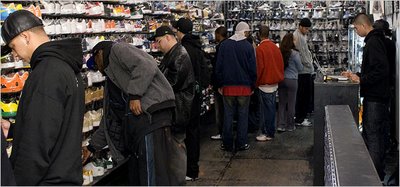 By ALEX KUCZYNSKI
By ALEX KUCZYNSKIMY deeply hip stepson sounded vaguely amused that I was planning to check out Flight Club, the sneaker resale boutique in NoHo. Who knows what they'll make of you, he said, his voice stopping on the "you" with just a bit too much force. The emphasis made me realize that he thinks I'm a total loser.
There are pros and cons to having stepchildren. One of the cons is that you get to relive all the terrifying insecurities of high school over and over and over again. It's one thing if your own progeny think you're uncool: you're the parent; you're supposed to be uncool. But we stepparents have only our status as potentially cool people to warm us at night.
Thus humbled, I walked into Flight Club several days ago. I was not the coolest person in the store. Then again, the people who frequent Flight Club are sneaker freaks, mostly men who are addicted to buying limited-edition vintage athletic footwear. They speak in highly technical language, tossing around terms like "tongue graphic" and "toe boxes" with the gravity of men discussing tractor engines or team sports.
At the heart of Flight Club's existence is the paradox of sneaker fetishism. Sneakers used to be things we wore until they wore out. Since the 1980's, when Nike transformed sportswear into a lifestyle, sneakers became status symbols, and tender young shoppers began to covet sneakers, and protect them, and tuck them into their little boxes at night, and even — horribly — kill one another over them. This is the economic force by which sneakers manufactured five years ago become more, not less, valuable as time goes on.
As a consumer culture we suffer from acute eBay-itis, meaning we can buy and sell vintage wares with ease and believe we are participating in some sort of communal art form. The sneakers in Flight Club represent that piquant, rapid recycling of nostalgia that marks so much fashion today, except that these shoes are nothing so crass as reconceptualized, new versions of old sneakers. They are actual old sneakers, artifacts transported as if through a time machine, still fresh in their boxes. Vintage models in "as new" condition are referred to as "dead stock," the preferred resale condition, complete with price tags and tissue paper.
Other factors also raise the price: if a shoe is a "quick strike," that means the manufacturer made only a limited number of the shoes. "Hyper strikes" refer to even more limited editions, often as few as two dozen pairs. At Flight Club, a bare long hallway of a store, the rarest shoes are in a glass case toward the back. This is where I found a pair of Reebok Court Victory Pump "Ball Out" sneakers, in size 10. They are made of the fuzzy, fluorescent fabric that covers tennis balls, and cost $600.
Other shoes cost more: the Nike Air Force 1 "Sakura," painted with delicate Japanese flowers, was marked for sale at $1,400. The Nike Dunk Lo Supreme "This Day in History" sneaker in tan and black, brand-new in the box, costs $800 in size 13. A Nike skateboarding shoe, the Dunk Lo "Pigeon," in gray and white, with a small orange-footed pigeon embroidered on the heel, is $2,500 in size 13; $2,000 in size 10.
THE entire back wall of the store is devoted to Air Jordans, the sneakers that revolutionized footwear. But, I asked one of the clerks, why Michael Jordan? "Because before Michael Jordan there was none of this," he said, sweeping his hand along the wall of shrink-wrapped individual Jordans as if showing off his new Picasso mural. "Back in the day it used to be all about the Adidas. Then Nike came along, and Michael Jordan came along, and that was that. Everything changed."
What's intriguing about Flight Club is that unlike most other sneaker boutiques, it sells sneakers on consignment. Consignment is a term I usually associate with tiny second-floor stores on the Upper East Side where formerly grand ladies of formerly grand means bid farewell to their Chanel suits, consigning their couture goods to the next generation, so they can pay the phone bill.
But consignment works downtown too. Potential sellers bring their new or gently worn sneakers to Flight Club, fix a price with the sales staff and receive 80 percent of the sale. While Air Jordans appear to make up Flight Club's bread and butter, the store also sells shoes from Puma, Visvim, Adidas and the Japanese company A Bathing Ape. I figured the name was some sort of anagram, but could only wrench "Beat hag pain" out of it. The name actually derives from a Japanese expression, "to bathe in lukewarm water," which the brand's designer has said refers to the shallow, comfortable lives he sees Tokyo teenagers living.
As uncool as I was — I was wearing Merrell hiking boots, which means I might as well have toddled in wearing white orthopedic shoes — the staff members were helpful. Maybe they were just amused by the sheer void of cool I represented. Maybe they were nice to me because I told them I was thinking of surprising my incredibly cool stepson with a pair of vintage Air Jordans.
The guy in charge handed me a card listing the vintage Air Jordan models, brandishing it with a flourish as if he were the sommelier with a list of rare wine. He was proud. I was cool.
Flight Club
254 Greene Street (between Eighth and Waverly Streets); (212) 505-2330
ATMOSPHERE Bare-bones utilitarian showroom so anonymous-looking you can walk right past without seeing it.
SERVICE Friendly, but I had the suspicion they were so friendly to me because I was such an obvious neophyte that they took pity.
PRICES About $200 to about $2,000.
No comments:
Post a Comment